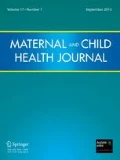Abstract
Objectives: The purpose of this study was to examine the independent role of paternal influences on the onset of prenatal care among Hispanic women. Methods: A total of 300 pregnant Hispanic women seeking prenatal care on or before their 35th week of gestation were surveyed about their and their partner’s pregnancy intention. Women in this study were recruited from clinics providing services to low income and medically indigent women. Results: Father’s pregnancy intention had a protective effect on the timely onset of prenatal care. Pregnancies that were unintended by the mother but were intended by the father had a lower likelihood of delayed care, as compared to those unintended by both (Odds Ratio [OR] = .54, 95% confidence interval [CI] = .28, .99). This trend was stronger among married than non-married couples. Conclusion: Comprehensive efforts are needed to involve male partners in family planning as well as in programs aimed at expanding adequate pre- and postnatal behaviors within Hispanics.
REFERENCES
Mayer JP. Unintended childbearing, maternal beliefs, and delay of prenatal care. Birth 1997;24:247–52.
Hulsey TM, et al. The influence of attitudes about unintended pregnancy on use of prenatal and postpartum care. J Perinatol 2000;20:513–9.
Pagnini DL, Reichman NE. Psychosocial factors and the timing of Prenatal Care among women in New Jersey’s Health Start Program. Fam Plan Perspect 2000;32(2):56–64.
Altfeld S, et al. Wantedness of pregnancy and prenatal health behaviors. Women Health 1997;26:29–43.
Thomson E, et al. Fertility desires and fertility: his, hers and theirs. Demography 1990;27(4):579–88.
Korenman S, et al. Consequences of infants on parental disagreement in pregnancy intention. Perspect Sex Reprod Health 2002;4(4):198–205.
Williams L. Determinants of couple agreement in US fertility decisions. Fam Plan Perspect1994;26(4):169–73.
Ortiz S, Casas JM. Birth Control and low-income Mexican-American Women: the impact of three values. Hisp J Behav Sci 1990;12:83–92.
Sangi-Haghpeykar H, et al. Condom use among sterilized and nonsterilized Hispanic women. Sex Transm Dis 2001;28(9):546–51.
Wiemann CM, et al. Racial/ethnic differences in the decision to breastfeed among adolescent mothers. Pediatrics 1998;101(6):E11.
Colley Gilbert B, Johnson CH, Morrow B, Ahluwalia IB, Gaffield ME, Fischer L, Rogers M, Whitehead N. PRAMS 1997 surveillance report. Atlanta, GA: Division of Reproductive Health, National Center for Chronic Disease Prevention and Health Promotion, Centers for Disease Control and Prevention, 1999.
Department of health and Human Services (DHHS), Public health Service, Healthy People 2010: National Health Promotion and Disease Prevention Objectives, Volume II, Second edition.
Goldscheider FK, Kaufman G. Fertility and commitment: Bringing men back in. Popul Dev Rev 1996;22(Suppl):87–99.
SAS Institute. Statistical Analysis Software: 8.0, Cary, NC: SAS Institute, 1999.
Joyce T, Kaestner R, Korenman S. The stability of pregnancy intentions and pregnancy-related maternal behaviors. Matern Child Health J 2000 Sep;4(3):171–8.
Henshaw SK. Unintended pregnancy in the United States. Fam Plann Perspect 1998 Jan–Feb;30(1):24–9, 46.
Matthews TJ, Ventura SJ, Curtin SC, Martin JA. Births of Hispanic origin, 1989–95. Mon Vital Stat Rep 1998 Feb 12;46(6 Suppl):1–28.
Morgan SP. Individual and couple intentions for more children: A research note. Dempgraphy 1985;22(1):125–32.
Kost K, et al. Predicting maternal behaviors during pregnancy: Does intention status matter? Fam Plan Perspect 1998;30(2):79–88.
Kost K, et al. The effect of planning status on birth outcomes and infant care. Fam Plan Perspect 1998;30(5):223–30.
Schaffer M, Lia-Hoagberg B. Effects of social support on prenatal care and health behaviors of low-income women. J Obstet Gynecol Neonatal Nurs 1997;26(4):433–40.
Boss, P. Family stress management. Newbury Park: Sage, 1988.
Author information
Authors and Affiliations
Corresponding author
Rights and permissions
About this article
Cite this article
Sangi-Haghpeykar, H., Mehta, M., Posner, S. et al. Paternal Influences on the Timing of Prenatal Care Among Hispanics. Matern Child Health J 9, 159–163 (2005). https://doi.org/10.1007/s10995-005-3012-9
Issue Date:
DOI: https://doi.org/10.1007/s10995-005-3012-9

